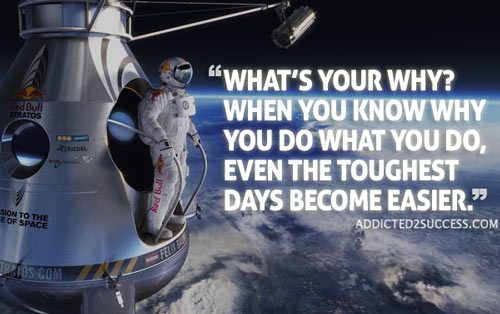Life
5 Keys to Discovering Your Ideal Life
How often do you hear “If I was retired I would do X, but I’m not retired yet, so it’s back to work Monday”? I hear this way too often, and you know what? If that’s your thought process you’re keeping it much too narrow.
There is no reason you can’t be living that ideal life now, before retirement. It just takes some intentional work to make it happen.
Here are five keys to figuring out your ideal life and making it happen:
1. What is your ideal life?
The first thing you need to do is know what your ideal life will look like. You won’t get there if you figure you’ll just know it when you see it. But the definition doesn’t have to be long and complicated. For me it’s having a business that allows me to spend much of my time in the mountains with my family.
You’re probably not going to come up with a statement like that on your first attempt. Really figuring out what your ideal life looks like takes months. You’ll most likely try on a few statements about your ideal life that you throw out because they’re not quite right.
To start designing it you need to ask yourself three questions:
- What is important to me?
- What activity leaves me with more energy than it takes?
- What is my purpose?
I knew that being a great father was important and that being out in the mountains gives me energy. Yesterday I spent nine hours hiking up a huge mountain and I have more energy for work today than I did any day last week. Once I really understood those two things I could start identifying the parts of my life that met my criteria for an ideal life.

2. What must be true for that to happen?
Once you know what your ideal life is like it’s time to figure out what needs to be true for that to happen. I know that to get to my ideal life I need a business model that’s one-to-many. I need to write a book or build a course and sell it to many people. Or I need to be doing more group coaching than one-on-one coaching. With a few truths about your business in hand you can evaluate your current business focus and decide what needs to get cut and what needs more time invested.
3. Define your systems
Systems are the lifeblood of any successful business. They’re the cleaning checklists or closing routines that ensure things happen at the right time and that you don’t forget anything. Most small business owners I talk to have no systems, and even if they do they often fail to use their systems. If you’re not using a system it may as well not exist.
The biggest net benefit in my business was building out my client vetting process. Having one standard email to send all prospects meant I had a simple, repeatable process that I could keep tweaking. When I hit a stumbling block in a project I could back track to my first emails and add in a question designed to tease out that stumble and either address it or ensure that I wouldn’t get that type of client again.
The second big benefit to systems is that you can get someone else to take them over. Once I had a defined email sequence for new clients and the answers I expected, I handed the initial few emails to my assistant which left me free to only deal with the prospects who were better qualified for my business.
4. Prepare for your season of hard work
It happens at every conference — someone asks me how I got my business to six figures in revenue. They ask because they want tips on how to get their business there as well. When I talk about making 10 contacts a day with new prospects, going to networking events, pitching other sites with content, working weekends and hard work in general, many tune out.
They didn’t really want to hear that reaching six figures required a bunch of work. They wanted some secret formula that would instantly produce success. They wanted the rewards without the work. That’s not how it works. If you want to get to your ideal life it’s likely going to take a season of hustle. You shouldn’t be working weekends for years, but doing so for six months, or even a year, as you get your ideal life business started is totally expected.
Even once you get going it’s likely you’ll have a few times when you’re going to need to hustle again to kick your business to the next level. Success is not effortless, it’s a product of hard work.
“When you live for a strong purpose, then hard work isn’t an option. It’s a necessity.” – Steve Pavlina
5. Take care of yourself and your relationships
As you’re on this journey and start to see some success it’s way too easy to just keep working harder. While it’s certainly true that hard work is the key to achieving your ideal life, doing so at the expense of your health or relationships with those around you yields a hollow success.
Those who fail to maintain a good balance risk looking back later at the aftermath of their success; children who won’t talk to them, a ruined marriage, poor health. They’re forced to ask themselves if all the money they’ve earned or ‘fame’ they’ve gained is really worth it.
It’s not! In the midst of working hard to design this ideal life and get it, make sure you take time out for the relationships you care about. Spend real time with your kids, without your phone to demand your attention. Date your partner. Take time to eat right and get some exercise.
You can have your ideal life. All you need to do is figure out what it is and then take intentional steps every day to get there.
What do you think is the most important key to discovering your ideal life?
Life
Imposter Syndrome Is Rooted in Your Past But Here’s How You Can Rewire It
Imposter syndrome is most prevalent in highly successful women

Imposter syndrome is “the persistent inability to believe that one’s success is deserved or has been legitimately achieved as a result of one’s own efforts or skills.” (more…)
Life
The Surprising Mental Health Tool You Probably Haven’t Tried
Through journaling, I arrived at a more balanced perspective, it reinstated my sense of gratitude and led me to accept my disability

In two particularly difficult times in my adult life, my journaling practice is helping me heal emotionally. It has been a vital tool for helping me see the bigger picture and land in a place of gratitude. (more…)
Life
How to Stop Comparing Yourself to Others and Find True Happiness
Comparison is the thief of joy; it robs us of our happiness, self-esteem, and peace of mind

In today’s hyperconnected world, it’s easier than ever to fall into the trap of comparing ourselves to others. Social media platforms like Instagram, Facebook, and LinkedIn constantly bombard us with curated highlights of other people’s lives, making it seem like everyone else is happier, more successful, and more fulfilled than we are. (more…)
Life
Harness the ‘Battery Effect’ to Transform Life’s Tensions into Your Greatest Strength
Recharge your life batteries by shifting your mindset today

I believe our life capacity is determined by the skillsets we develop on this spinning rock we call Earth. By “life capacity,” I mean our ability to embrace and sustain joy. (more…)
-

 Personal Development4 weeks ago
Personal Development4 weeks agoWant to Change the World? Start by Sharing Your Knowledge
-

 Success Advice3 weeks ago
Success Advice3 weeks agoThe One Mindset Shift That Made Me Irreplaceable At Work
-

 Scale Your Business3 weeks ago
Scale Your Business3 weeks agoWhy Smart Entrepreneurs Never Skip This One Business Expense
-

 Success Advice2 weeks ago
Success Advice2 weeks agoHow Playing by the Rules Became the Smartest Business Strategy
-

 Did You Know2 weeks ago
Did You Know2 weeks ago7 Surprising Life Lessons Video Games Taught Me That School Never Did
-

 Success Advice2 weeks ago
Success Advice2 weeks agoHow to Build Trust, Kill Micromanagement, and Lead a Team That Thrives
-

 Scale Your Business2 weeks ago
Scale Your Business2 weeks agoHow to Build a Workplace People Actually Want to Show Up To
-

 Success Advice1 week ago
Success Advice1 week agoSuccess Isn’t Sexy: 5 Daily Habits That Actually Work


























1 Comment